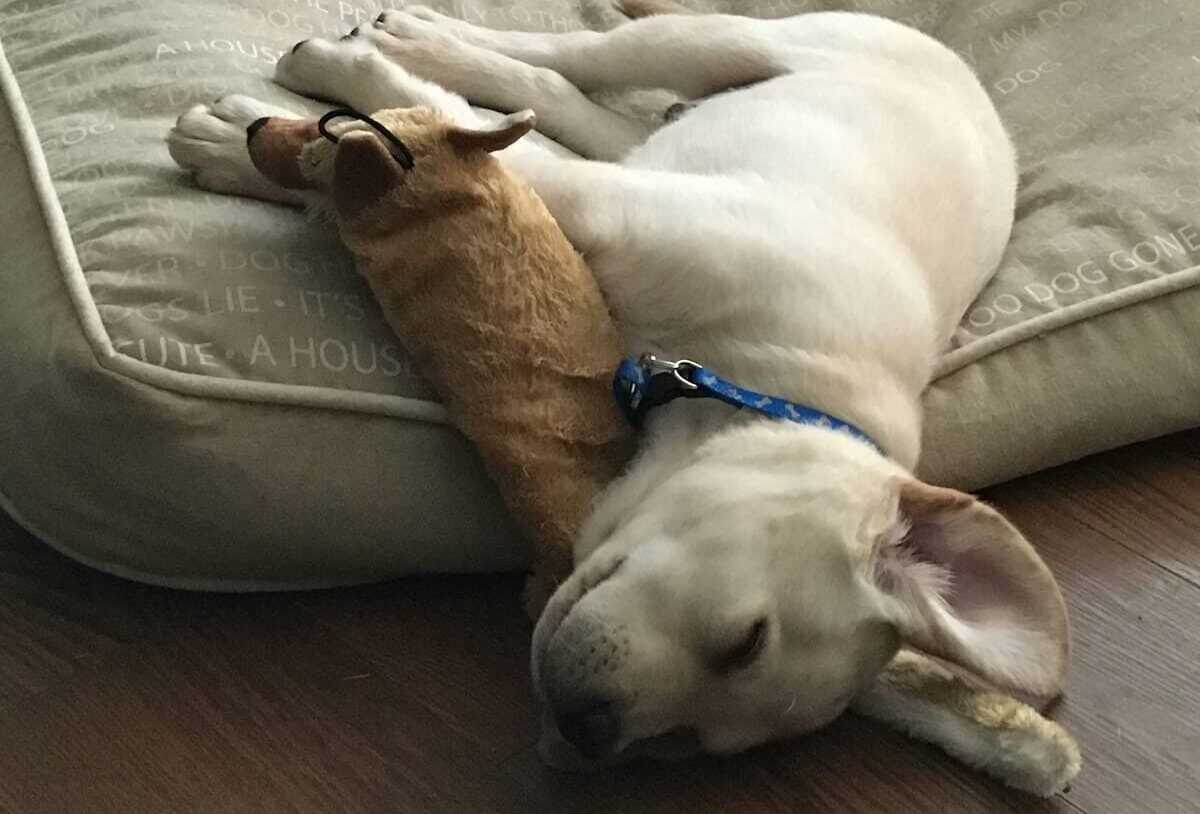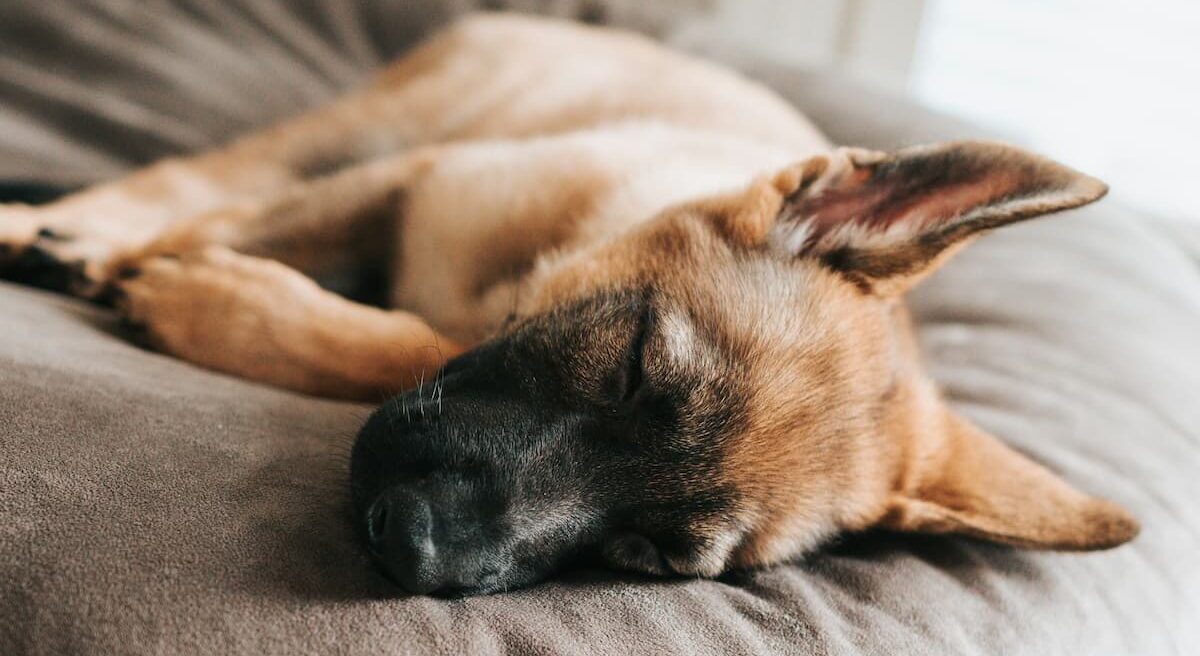Have you ever curled up beside your sleeping furry friend, only to be startled by the sudden shakes and twitches that seem to take over their little body?
It’s a sight that never fails to make me wonder: why do dogs shake when they sleep?
Read on to find the reasons why.
Why Do Dogs Shake When Sleeping?
Have you ever noticed that your furry friend starts shaking or twitching while they’re fast asleep?
It’s a common sight for dog owners, but have you ever wondered why dogs shake when sleeping?
Well, the answer may not be as straightforward as you think.
One key reason behind this intriguing behavior lies in the different stages of sleep that dogs experience.
Just like humans, dogs enter a series of sleep cycles throughout the night, consisting of rapid eye movement (REM) sleep and non-REM sleep.
During REM sleep, which is the stage when most dreaming occurs, dogs may twitch, kick their legs, or even vocalize due to the heightened brain activity and vivid dreams they’re experiencing.
So, what could your furry companion be dreaming about that triggers the shakes?
The answer is not so far-fetched.
Dogs often dream about activities they engage in during the day.
These dreams can range from chasing balls in the park to digging holes in the backyard.
Think of it as their imagination running wild while they catch some Zs.
The muscles in their body contract and relax as if they were actually participating in these activities.
No wonder the shakes are so vivid!
Another factor contributing to the shaking during slumber is the dog’s natural instinct.
Dogs are incredibly active animals, and even in their sleep, their brains are wired to be alert to potential dangers.
This instinctual response triggers muscle movements and involuntary twitches, which could explain why your dog occasionally appears to be running or chasing something while snoozing peacefully on their bed.
Dogs shaking while sleeping could also be linked to their muscle and nerve activity.
When dogs sleep, their muscles can relax to the point of a full-blown shake.
This shaking might be a natural way for their body to release tension or relieve any stress that might have built up during the day.
Think of it as the canine equivalent of you sighing after a long, tiring day!
There’s one more thing to consider when it comes to your dog’s sleep-time shivering.
Dogs rely on their movements to regulate their body temperature, even while they sleep.
When they shake or shiver, it’s their way of generating heat and ensuring they stay warm.
So, while it may look a bit odd, it’s just one of nature’s clever mechanisms to protect our furry friends.
Creating a Cozy Sleep Space for Your Furry Friend
Having a comfortable sleep environment is essential for our furry friends as it directly affects their overall well-being.
If your dog shakes when sleeping, it may be a sign of discomfort or anxiety.
Here are some tips to create a soothing sleep haven for your beloved pet:
1. Choose a cozy bed: Invest in a comfortable dog bed that provides ample support and cushioning.
Opt for a bed with memory foam or orthopedic features, especially if your dog is older or has joint issues.
This will help relieve any pressure points and reduce the chances of shaking during sleep.
2. Maintain a consistent routine: Dogs thrive on routine, so establishing a consistent sleep schedule can help them feel secure and relaxed.
Try to maintain regular mealtimes, exercise sessions, and bedtime routines.
This predictability will promote better quality sleep for your furry friend.
3. Minimize noise and distractions: Dogs can be sensitive to noises and disruptions, leading to restless sleep.
Create a calm and quiet environment by closing windows, using curtains to block outside light, and using white noise machines or soothing music to mask any disturbing sounds.
This will help your dog feel more at ease and reduce the likelihood of shaking while sleeping.
By implementing these tips, you can provide your furry friend with a comfortable sleep environment that promotes restful sleep and reduces shaking.
Remember, a well-rested dog is a happy dog, and creating a peaceful space for them will contribute to their overall happiness and health.
Time to Ensuring Your Dog’s Well-being to a Professional
In most cases, there is no need to worry about your pooch’s nocturnal shaking as it is completely normal for dogs to shake while they sleep.
However, there are certain instances where you should seek professional help to ensure your furry friend’s well-being:
1. Carefully observe the shaking: While it is normal for dogs to experience mild tremors during their sleep, excessive shaking could be a cause for concern.
If your dog’s shaking seems severe or uncontrollable, it could be a sign of an underlying medical condition.
Make sure to observe the duration, intensity, and frequency of the shaking episodes, as this information will be helpful for your veterinarian.
2. Monitor for additional symptoms: Pay attention to any additional symptoms your dog may be exhibiting along with the shaking.
If you notice your dog is shaking while awake or when engaged in physical activity, it could indicate a potential health issue.
Other symptoms such as lethargy, decreased appetite, or changes in behavior should not be ignored and warrant a visit to the vet.
3. Seek professional help: If you’re ever in doubt about your dog’s well-being, it is always best to consult a veterinarian.
They have the expertise to diagnose any underlying medical conditions causing the shaking and provide appropriate treatment.
They will conduct a thorough physical examination, ask about your dog’s medical history, and may perform additional tests if necessary.
Remember, seeking professional help is crucial to ensure your furry companion’s health and happiness.
In conclusion, while it may be unnerving to see your dog shaking in their sleep, it is generally normal behavior.
However, if the shaking appears severe, frequent, or is accompanied by other concerning symptoms, it is best to seek professional help.
Your dog’s well-being is paramount, and a visit to the vet can provide you with peace of mind and help identify any underlying health issues.
Remember, you are your dog’s best advocate, so trust your instincts and reach out to a professional when necessary.
FAQ
Q: Is it normal for dogs to shake a little during sleep?
A: Absolutely!
Slight shaking or twitching during sleep is perfectly normal for dogs.
Just like humans, our furry companions go through different sleep stages, which include periods of deep sleep and rapid eye movement (REM) sleep.
During REM sleep, dogs may experience muscle twitches, which can cause them to shake a little bit.
Q: Do all dogs shake when they sleep?
A: Not all dogs shake during sleep.
It can vary from dog to dog, based on a variety of factors such as age, breed, individual temperament, and overall health.
It’s important to keep in mind that shaking during sleep should be mild and not cause any distress or discomfort for your canine pal.
If you notice any excessive or abnormal shaking, it’s always a good idea to consult your veterinarian.
Q: Are there any health issues that could cause dogs to shake while sleeping?
A: Generally, shaking during sleep is benign and nothing to worry about.
However, in some cases, certain health conditions might contribute to more pronounced shaking while sleeping.
For example, older dogs with arthritis or muscular issues may experience more noticeable tremors.
If you suspect your furry friend’s shaking is abnormal or worsening over time, it’s best to consult your vet for a proper evaluation.
Q: Can dreaming be a reason for dogs to shake during sleep?
A: Indeed!
Much like us, dogs have vivid dreams too.
While we can’t say for sure what they dream about (squirrels, perhaps?), it’s believed that the neurological activity associated with dreaming could trigger those adorable shake sessions.
Sometimes, you may even notice their paws twitching or see them make running motions as if chasing something in their dreams!
Q: Should I wake up my dog if they’re shaking a lot during sleep?
A: In most cases, it’s best to let sleeping dogs lie, quite literally!
Since it’s normal for dogs to experience minor shaking or twitching during sleep, it’s usually unnecessary to wake them up.
Just like us, they need uninterrupted rest to recharge their batteries.
If your furry pal seems otherwise healthy and comfortable, there’s generally no need for concern.
Q: What can I do to ensure my dog has peaceful sleep and avoid excessive shaking while sleeping?
A: Creating a cozy and comfortable sleeping environment is key for your dog to achieve a peaceful slumber.
Consider providing a comfy bed or pillow in a quiet spot where they feel secure.
Regular exercise, mental stimulation, and a consistent bedtime routine can also contribute to a good night’s sleep.
Remember, well-rested dogs are happy dogs!
Q: To sum it up, why do dogs shake when they’re sleeping?
A: Dogs shaking while they sleep is commonly caused by the normal muscle twitches during REM sleep.
These twitches and shakes are perfectly natural and indicate that your pup is having a proper snooze!
However, if the shaking appears excessive, continues when awake, or you notice any other concerning symptoms, it’s always wise to consult your veterinarian for a thorough examination.
Now that we’ve cracked the case of the sleep shivers, watch your furry friend snooze away and embrace the cuteness overload that comes with it!
Key Takeaways
These nocturnal shakes may seem strange or even humorous at first, but understanding the reasons behind this behavior can provide insight into our dogs’ health and well-being.
Whether they’re dreaming of chasing rabbits or just enjoying a deep snooze, dogs go through various sleep stages, just like humans.
During the REM (Rapid Eye Movement) phase, their brains become highly active, and it comes as no surprise that their paws may twitch, muscles may contract, and yes, even their whole bodies might shake.
But let’s not jump to conclusions and assume that every shake signifies a seizure or a health problem.
In most cases, these twitches and shakes are completely harmless and completely normal.
In fact, they may even be a testament to your furry pal’s overall good health.
It’s important, however, to keep an eye on any abnormal or frequent shaking.
If your dog seems distressed or the shaking is accompanied by other concerning symptoms, it’s always wise to consult your veterinarian.
After all, they are the true experts when it comes to your pet’s health.
In the end, let’s embrace our canine companions’ adorable and quirky sleep habits, including their little shake sessions.
Just like us, they are individuals with their own unique personalities and sleeping patterns.
So the next time you see your pup shaking away during a dream, feel free to chuckle, snap a cute picture, and rest easy knowing that they are just having a good ol’ time traveling through dreamland.














